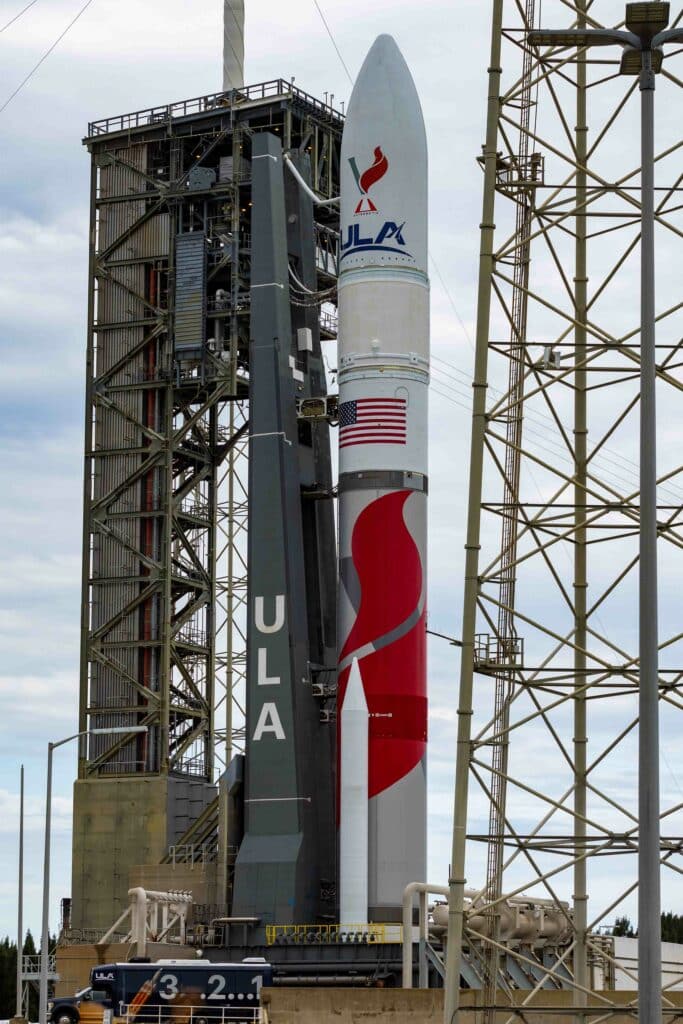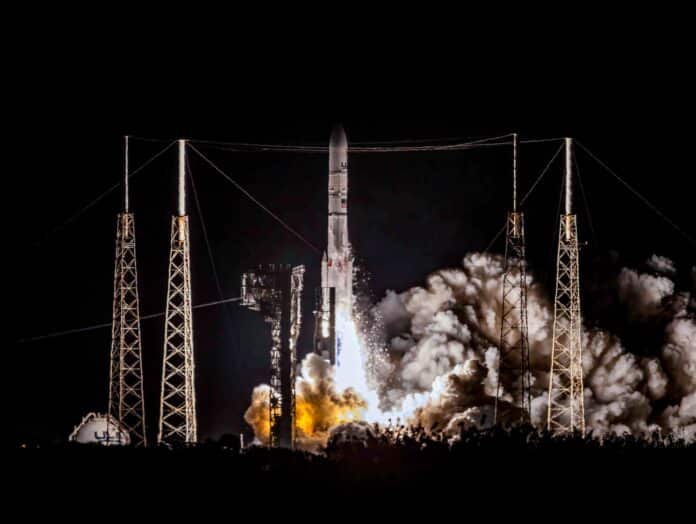A spectacular space launch early on Monday morning, Jan. 8, from Cape Canaveral marked a major milestone in NASA’s Artemis program, with the first US lunar lander in 50 years being sent on its way to the moon. The last US spacecraft to land on the moon was Apollo 17 in 1972. Though unmanned, the lander is a critical step toward returning humans to the lunar surface, potentially in 2025. (Many experts believe the date may slip to 2027 due to delays in the program.) The 2:18 AM launch on Jan. 8 from United Launch Alliance’s (ULA) Pad 41 was viewed by thousands worldwide via the internet and in person.

Made for NASA by the private Pennsylvania company Astrobotic, the lander called Peregrine will deliver a bevy of scientific payloads to the moon for NASA and several private companies. Peregrine is slated to land in the south pole region of the moon on Feb. 25, a region yet unexplored by the US Space Program. The moon’s south pole has become an important destination for both private companies and governments around the world, as that is where it is believed water in the form of ice will be found. The ability to capture water from the lunar surface is critical for any sustained manned presence on the moon. Lunar water could be used for oxygen, fuel production, radiation shielding, drinking water, and irrigation purposes in a future lunar colony.
A Technological First
Aside from the importance of the lunar lander, the mission is far from a “one trick pony.” The very rocket booster that flawlessly propelled the lander to orbit is ULA’s new Vulcan. The Vulcan is the first US spacecraft ever to use a new generation of methane/oxygen-fueled engines known as “Methalox” engines. Underscoring the booming era of commercial space flight, the BE-44 engines were designed by Blue Origin, an aspiring commercial launch company owned by Amazon’s Jeff Bezos. Methalox engines burn cleaner and produce more power than the current kerosene and hydrogen/oxygen fuels used in most launches today. Prior to Monday’s launch, no American company has successfully orbited a Methalox-powered rocket despite at least three other attempts. Relativity’s Terran 1 and SpaceX’s two Starship test flights all failed on ascent.

The Star Trek Legacy Becomes Eternal
Monday’s mission carried another commercial payload bound for an area of space far beyond the moon. A legendary cargo was placed on board by Texas-based Celestis, Inc. Celestis, a memorial company, has been sending human ashes up for a “burial in space” for over twenty-five years. Dubbed the “Enterprise Flight,” one-gram samples of the ashes of Star Trek stars Nichelle Nichols, James Doohan, Majel Barrett Roddenberry, as well as Star Trek creator Gene Roddenberry and visual-effects artist Douglas Trumbull were on board. The DNA samples and remains were sent into space in small capsules as secondary payloads. The legendary Star Trek crew, along with several others, will continue on an eternal flight after Vulcan’s primary mission of sending Peregrine on its way to the moon has concluded.
According to the Celestis website, Celestis.com, The Celestis Enterprise Flight ™ after launching from planet Earth will travel beyond the Earth-Moon system, beyond the James Webb telescope, and into interplanetary deep space – where it will join the other planets, moons, comets, and asteroids in our solar system on a never-ending journey through the cosmos.
Upon completion of its powered burn and coast phase, the Enterprise Flight will become Enterprise Station™ – the most distant permanent human repository outpost and a pathfinder for the continuing human exploration of space.
A Ten-Year-Old Future Astronaut Leaves Her Mark on The Mission

As if lunar landers, new engines, and space memorials were not enough for one flight, there’s another important cargo aboard. Ten-year-old Elizabeth Norman of Leicester, England, became the first kid ever to send a payload to the moon with Monday’s launch.

Sometimes, the smallest payloads are the biggest. Elizabeth, who goes by the name “Astro Liz” on the internet, has her sights set on the stars. As a loveable and determined advocate of space flight and the importance of STEM education (Science, technology, Engineering, and Mathematics), the self-proclaimed future astronaut has made it her mission to get other kids interested in the field. Astro Liz’s online efforts garnered the attention of ULA CEO Tory Bruno nearly three years ago when Liz was only seven. Bruno first saw Liz after she appeared online with a homemade science experiment, her own flyable Vulcan Centaur rocket, modeled after the ULA booster, that was then still in development. Bruno was so enamored with Astro Liz’s efforts that he, in conjunction with lunar lander manufacturer Astrobotic, invited her to send a small payload to the lunar surface on the Peregrine lander. The lander will contain a time capsule, and a sticker, “Astro Liz’s Lab,” will be in it. The DHL space shipping container will also contain artifacts by others who paid for the privilege. One observer quipped, “Like any good space line, “Kids Fly Free.”
A Family Thing
Elizabeth’s grandmother, Kimberly, came to Florida to witness the launch in person following an invitation from ULA CEO Tory Bruno. During an interview with Hernando Sun, Kimberly gushed with pride at her granddaughter’s accomplishments. She said she was amazed by Elizabeth’s enthusiasm for science, adding that she and her daughter (Elizabeth’s mom) have a science background, and were so grateful that Elizabeth shares their passion for scientific curiosity.
Noting that the Queen of England recognized Elizabeth’s efforts in a 2022 letter to the young astronaut, Kimberly added that she wished Elizabeth could have been there in person. She said Elizabeth was busy at home in Leicester attending a city-wide celebration held in Elizabeth’s honor on launch day.

You can follow Astro Liz’s journey to space as the youth correspondent for Florida Media Now at www.floridamedianow.com on “X” (formerly Twitter) @AstroLizsLab, on YouTube @AstroLiz, and on Instagram at Astro_Lizs_Lab.
Florida Media Now Senior Correspondents Charles Boyer and TJ Waller contributed to this article.

